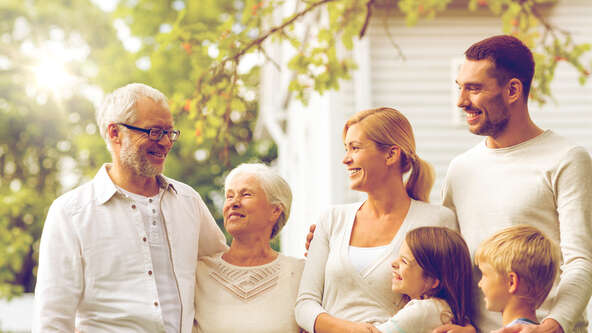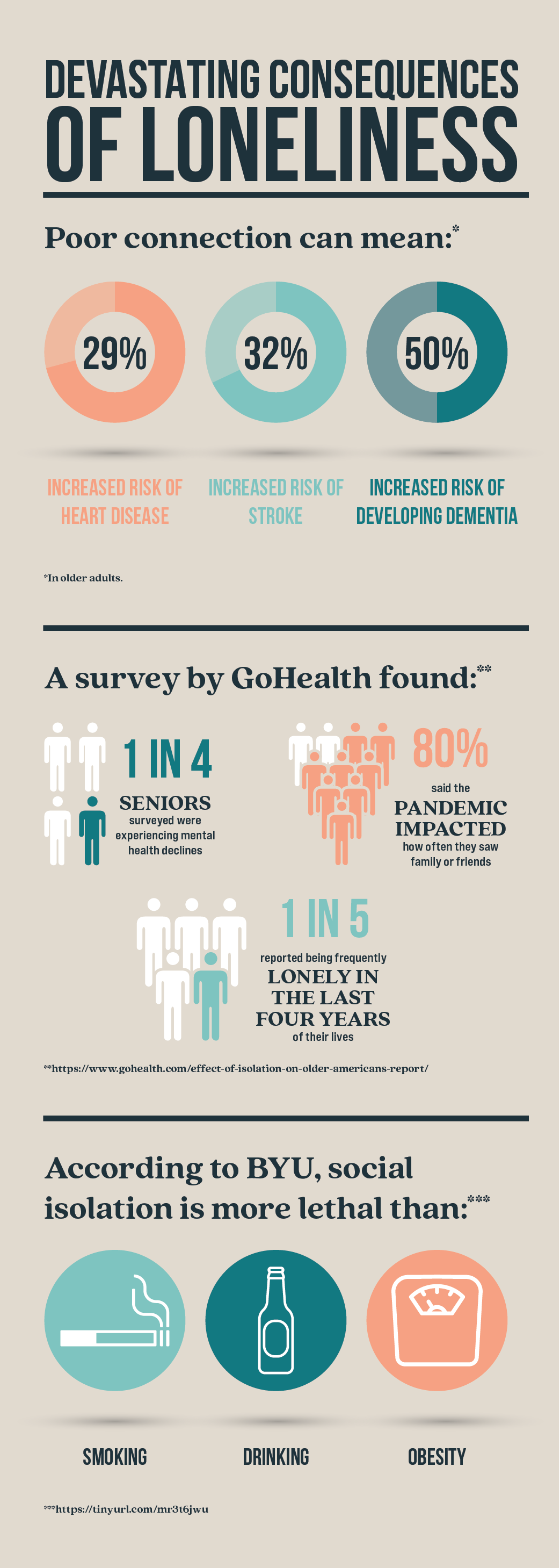From Solitude to Solidarity: A Guide to Connecting in Life's Final Moments

Loneliness After Losing Someone
Loneliness is as deadly as smoking 15 cigarettes a day or consuming six alcoholic drinks, according to the U.S. Surgeon General.
Dr. Vivek H. Murthy says he had a “lightbulb” moment about the loneliness crisis after conducting a cross-country listening tour. Over and over, he heard people talk about feeling "isolated, invisible, and insignificant.”
Devastating Consequences
The consequences of the loneliness epidemic can be devastating. Poor connection can mean a 29% increased risk of heart disease, 32% increased risk of stroke and a 50% increased risk of developing dementia in older adults.

A study by health insurance marketplace company GoHealth found that one in four seniors surveyed were experiencing mental health declines, almost a third were lonely and 80% said the pandemic had impacted how often they saw family or friends. Another study found one in five reported being frequently lonely in the last four years of their lives. According to research sponsored by AARP, isolation is associated with an increased likelihood of early death, dementia and heart disease. Social isolation is more lethal than excessive drinking, smoking or obesity, according to research by BYU.
High-tech and Low-tech Solutions
According to Hospice News, solutions both high and low-tech can, and are, helping fight isolation in hospice while other approaches can help bridge the gap at home.
Hospices around the country have invested in many technology platforms to give residents access to online content, conferencing and calling.
Whether online or in person, from arts and crafts to relaxation and religious gatherings, having programs that provide structure and purpose can help residents feel connected and engaged, experts say.
Physicians can be more proactive in asking about patients’ lives at home. Just giving them space to discuss their social lives can be therapeutic, says Dr. Ashwin Kotwal, an assistant professor of geriatrics at the University of California in San Francisco, and lead author of an isolation study.
How Families, Neighbors and Volunteers Can Help
Families can also set up regular calls or visits where possible, or even stream a movie together or set up a monthly “book club.”
Neighbors and community groups can play a role. The social network site Nextdoor is working with researchers studying the impact of small acts of kindness by neighbors.
Researchers have also looked at grassroots pen pal programs, but the jury is still out as to whether they are effective.
Volunteers can make a difference with regularly scheduled phone calls, studies have found. Many nonprofit programs seek to connect volunteers to isolated seniors and disabled folks. You can find them in your area by searching online or checking reliable sources like this piece from AARP. Volunteering is helpful both to those who volunteer and to the people they are paired with. It’s a win-win.
The surgeon general’s report lists six ways the nation can address loneliness including strengthening public spaces like parks and libraries. Others say having more "third spaces" can alleviate isolation.
Coping with Loss
Grief is complex, and no two journeys are the same. This guide offers insight into what you may experience and resources to help along the way.
Advice, Resources and Tips
Whether you are a health or hospice care provider, family member or senior in need of services, there are additional resources and information available.
New York Times columnist Nicholas Kristoff writes, “The steps to tackle loneliness aren’t grand, high-tech or expensive. In fact, one of the strategies is simply to get people back into old-fashioned patterns like eating meals together, holding parties and volunteering to help one another out.”
For more advice on how to handle difficult times, we've created Bracing for Goodbye: Finding Strength in Life's Toughest Moments.
- Apopka
- Auburndale
- Belleview
- Bradenton
- Brevard County
- Cape Coral
- Charlotte County
- Clewiston
- Cocoa Beach
- Collier County
- Daytona Beach
- Deltona
- Englewood
- Fort Myers
- Haines City
- Hendry County
- Hillsborough County
- Kissimmee
- LaBelle
- Lady Lake
- Lake County
- Lakeland
- Land O' Lakes
- Largo
- Lee County
- Manatee County
- Marco Island
- Marion County
- Melbourne
- Naples
- New Smyrna Beach
- North Port
- Ocala
- Orange County
- Orlando
- Ormond Beach
- Palm Bay
- Palm Coast
- Pasco County
- Pinellas County
- Polk County
- Port Charlotte
- Port Orange
- Punta Gorda
- Rockledge
- Sanford
- Sarasota
- Sarasota County
- Satellite Beach
- Sebastian
- Seminole
- St. Petersburg
- Sumter County
- Sun City Center
- Tampa
- Tavares
- The Villages
- Titusville
- Venice
- Volusia County
- Wildwood
- Winter Haven
- Winter Park
- Afton
- Andover
- Apple Valley
- Arden Hills
- Barnum
- Bayport
- Belle Plaine
- Bethel
- Big Lake
- Birchwood Village
- Blaine
- Bloomington
- Brooklyn Center
- Brooklyn Park
- Brookston
- Buffalo
- Burnsville
- Carlton
- Carlton County
- Carver
- Centerville
- Chanhassen
- Chaska
- Chisago City
- Circle Pines
- Cloquet
- Coates
- Cologne
- Columbia Heights
- Columbus
- Corcoran
- Cottage Grove
- Cromwell
- Crystal
- Dakota County
- Dayton
- Deephaven
- Delano
- Dellwood
- Duluth
- Eagan
- East Bethel
- Eden Prairie
- Edina
- Elko New Market
- Elk River
- Excelsior
- Falcon Heights
- Farmington
- Forest Lake
- Fridley
- Gem Lake
- Golden Valley
- Grant
- Greenfield
- Greenwood
- Ham Lake
- Hampton
- Hanover
- Hastings
- Hennepin County
- Hermantown
- Hilltop
- Hopkins
- Hugo
- Inver Grove Heights
- Jordan
- Lake Elmo
- Lakeland
- Lakeland Shores
- Lake Saint Croix Beach
- Lakeville
- Landfall
- Lauderdale
- Lexington
- Lilydale
- Lindström
- Lino Lakes
- Little Canada
- Long Lake
- Lonsdale
- Loretto
- Mahtomedi
- Maple Grove
- Maple Plain
- Maplewood
- Medicine Lake
- Medina
- Mendota
- Mendota Heights
- Miesville
- Minneapolis
- Minnetonka
- Minnetonka Beach
- Monticello
- Moose Lake
- Mound
- Mounds View
- New Brighton
- New Hope
- Newport
- New Prague
- New Trier
- North Oaks
- North St. Paul
- Nowthen
- Oakdale
- Oak Grove
- Oak Park Heights
- Orono
- Osseo
- Otsego
- Pine Springs
- Plymouth
- Prior Lake
- Ramsey
- Ramsey County
- Randolph
- Rockford
- Rogers
- Rosemount
- Roseville
- Saint Louis County
- Saint Louis Park
- Saint Mary's Point
- Savage
- Scandia
- Scanlon
- Shakopee
- Shoreview
- Shorewood
- South Saint Paul
- Spring Lake Park
- Spring Park
- St. Anthony
- St. Bonifacius
- St. Francis
- St. Paul
- St. Paul Park
- Stacy
- Stillwater
- Sunfish Lake
- Tonka Bay
- Vadnais Heights
- Vermillion
- Victoria
- Waconia
- Watertown
- Wayzata
- West St. Paul
- White Bear Lake
- Willernie
- Woodbury
- Woodland
- Wrenshall
- Alhambra
- Aliso Viejo
- Amador City
- Amador County
- American Canyon
- Anaheim
- Angels Camp
- Antioch
- Arcadia
- Artesia
- Auburn
- Baldwin Park
- Berkeley
- Biggs
- Bradbury
- Brea
- Brentwood
- Buena Park
- Butte County
- Capitola
- Carmel-by-the-Sea
- Carpinteria
- Chico
- Chino
- Claremont
- Colusa
- Compton
- Concord
- Contra Costa County
- Costa Mesa
- Covina
- Cupertino
- Cypress
- Davis
- Del Rey Oaks
- Diamond Bar
- Dixon
- Downey
- Duarte
- Dublin
- East Palo Alto
- El Dorado County
- Elk Grove
- El Monte
- Fairfield
- Fontana
- Fountain Valley
- Fremont
- Fullerton
- Galt
- Gardena
- Garden Grove
- Gilroy
- Glendora
- Gonzales
- Half Moon Bay
- Hayward
- Hollister
- Ione
- Irvine
- Irwindale
- Isleton
- Jackson
- Laguna Hills
- Laguna Niguel
- Laguna Woods
- La Habra
- Lake Forest
- Lakewood
- La Mesa
- La Palma
- Larkspur
- Lathrop
- Lincoln
- Livermore
- Lodi
- Los Altos
- Manteca
- Marina
- Martinez
- Milpitas
- Mission Viejo
- Modesto
- Monrovia
- Montclair
- Monterey
- Monterey County
- Monte Sereno
- Mountain View
- Napa
- Newark
- Norco
- Norwalk
- Oakdale
- Oakland
- Ontario
- Orange
- Orange County
- Orland
- Oroville
- Pacific Grove
- Palo Alto
- Pine Grove
- Pioneer
- Placentia
- Placer County
- Placerville
- Plymouth
- Pomona
- Rancho Cucamonga
- Rancho Santa Margarita
- Redwood City
- Richmond
- Rio Vista
- Ripon
- Rocklin
- Roseville
- Sacramento
- Sacramento County
- Salinas
- San Buenaventura
- San Carlos
- Sand City
- San Diego County
- San Dimas
- San Francisco
- San Gabriel
- San Joaquin County
- San Jose
- San Juan Bautista
- San Juan Capistrano
- San Leandro
- San Mateo
- San Mateo County
- Santa Ana
- Santa Barbara
- Santa Barbara County
- Santa Clara
- Santa Clara County
- Santa Cruz
- Santa Cruz County
- Santa Fe Springs
- Saratoga
- Scotts Valley
- Seaside
- Signal Hill
- Soledad
- Soquel
- South Gate
- South San Francisco
- Stanton
- Stockton
- Suisun City
- Sunnyvale
- Sutter County
- Sutter Creek
- Tehama
- Temple City
- Tracy
- Tustin
- Upland
- Vallejo
- Villa Park
- Walnut
- Walnut Creek
- Watsonville
- West Covina
- Westminster
- Whittier
- Willows
- Woodland
- Yorba Linda
- Yuba City
- Albany
- Amsterdam
- Beacon
- Canajoharie
- Clifton
- Englewood
- Fulton County
- Fultonville
- Garfield
- Garnerville
- Glen Cove
- Gloversville
- Hackensack
- Haverstraw
- LaFayette
- Montgomery County
- Newburgh
- New Rochelle
- New York
- Onondaga County
- Paterson
- Peekskill
- Rockland County
- Rye
- Schenectady
- Syracuse
- White Plains
- Yonkers
- Auburn
- Bellevue
- Bothell
- Brier
- Carnation
- Centralia
- Clyde Hill
- Duvall
- Edmonds
- Everett
- Federal Way
- Granite Falls
- Issaquah
- Kenmore
- Kent
- King County
- Kirkland
- Lacey
- Lakewood
- Langley
- Lewis County
- Lynnwood
- Marysville
- Medina
- Mercer Island
- Mill Creek
- Mountlake Terrace
- Mukilteo
- Newcastle
- Normandy Park
- Oak Harbor
- Oakville
- Olympia
- Pierce County
- Poulsbo
- Puyallup
- Redmond
- Sammamish
- Seattle
- Snohomish
- Snohomish County
- Sumner
- Tacoma
- Thurston County
- Tukwila
- Tumwater
- University Place
- Woodinville
- Woodway
- Adams County
- Arapahoe County
- Arvada
- Aurora
- Boulder
- Boulder County
- Brighton
- Castle Pines
- Cherry Hills Village
- Colorado Springs
- Commerce City
- Dacono
- Denver
- Douglas County
- El Paso County
- Evans
- Fort Collins
- Fort Lupton
- Fountain
- Glendale
- Golden
- Greeley
- Greenwood Village
- Jefferson County
- Lafayette
- Lakewood
- Larimer County
- Littleton
- Lone Tree
- Longmont
- Louisville
- Loveland
- Northglenn
- Parker
- Weld County
- Wellington
- Westminster
- Wheat Ridge
- Windsor
- Archdale
- Asheboro
- Belmont
- Bessemer City
- Burlington
- Charlotte
- Claremont
- Concord
- Conover
- Forsyth County
- Graham
- Greensboro
- Guilford County
- Hickory
- High Point
- Iredell County
- Kernersville
- King
- Lexington
- Locust
- Lowell
- Mecklenburg County
- Monroe
- Mount Holly
- Newton
- Randleman
- Rock Hill
- Salisbury
- Statesville
- Tega Cay
- Thomasville
- Trinity
- Winston-Salem